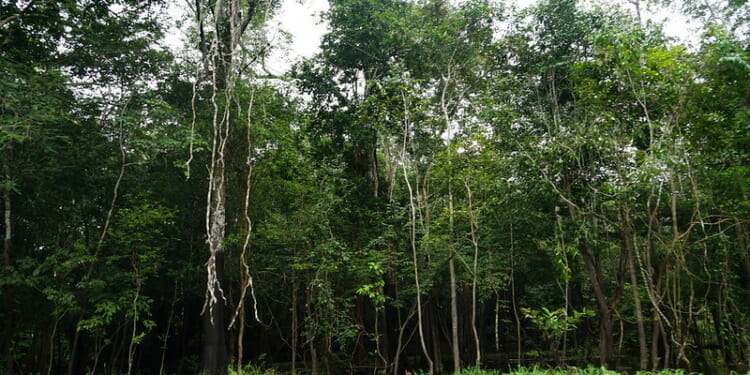Deforestation in the Amazon has been occurring for years as mining and commercial farming has risen in Brazil. As deforestation continues, this could have a greater impact on the environment, as the trees in the Amazon rainforest prove to be essential to prevent climate change.
In January of 2022, Brazil recorded record high deforestation rates after 430 sq miles of land were eradicated in the last month. Brazil’s space agency Inpe reported deforestation is five times higher than January of 2021.
Environmentalists are pointing toward Brazilian President Jair Bolsonaro for weakening protections in the rainforest, making it easy for loggers to cut down trees. After Bolsonaro took a pledge at the UN climate summit in 2021 to end deforestation by 2030, contradictions and mischief seem to be in order.
Soya farming has posed problems in the Amazon for years.
Typically, soya is used by dairy, cattle, pig and poultry farmers to feed their livestock. Though this feed proves to be quite toxic to the environment.
In order to grow soybean crops, large amounts of hazardous chemicals such as acid neutralizing lime, synthetic fertilizers, pesticides and herbicides are required in the soybean production process. These toxic chemicals are detrimental to the environment contaminating forests, infecting rivers and killing wildlife, as well as being harmful to humans.
Despite the warning label, commercial farmers have been clearing out trees for soybean crop space for years, especially in the Amazon. At the same time, many countries such as the UK, U.S. and others are continuing to buy soya from Brazil for their feedstock.
Without trees in the Amazon, this would have massive repercussions on climate change. The rainforest is known to absorb huge amounts of carbon dioxide from the air, the Amazon being considered a carbon sink. As more trees are cut down, the fewer emissions the rainforest can soak up.
The Amazon accounts for roughly 30% of the Earth’s remaining tropical forests and produces 20% of the world’s oxygen — a large portion of oxygen humans rely on. Simultaneously, scientists estimate 20% of trees in the rainforest have already been cut down and predict in the next two decades the total could rise to 40% and another 20% degraded.
Not only does this elimination of trees have massive repercussions on climate change, but creates a domino effect for all trees in the rainforest. Amazonian trees produce half of their own rainfall through the moisture they release into the atmosphere. By eliminating trees, half of this rainfall goes away resulting in a domino effect of trees dying and nearby soil becoming dry, eventually desolate and inhabitable.
Alongside the deterioration of the environment, indigenous people also rely on the Amazon for food and shelter, much of their land and way of life being destroyed in the meantime.
Since the 1990s, the area planted with soya in the Amazon has expanded at a rate of 14.1% per year and currently covers more than eight million hectometers of land.
In 2006, the Amazon soy moratorium was introduced in Brazil, banning the sale of soya grown on deforested land after 2008. Between the years 2004 and 2012, clearing of trees in the Amazon had fallen by 84% — but, despite the act’s ability to eliminate land being cleared for soya, farmers are still able to get away with wiping out land for other crops.
As the bill only includes soya crops, farmers are able to clear out the land for other commodities such as maize and cattle.
Researchers from the Brazilian NGO Institute Centro de Vida, Greenpeace’s Unearthed and the Bureau of Investigative Journalism found that farmers cleared up to 450 sq miles of land in Mato Grosso state, the southern part of the Amazon, for these other such commodities between the years 2009 to 2019.
Weakened protections have made deforestation worse in recent years
Bolsonaro has significantly weakened protections since he took office in 2019. For reasons of economic prosperity, he has weakened laws to allow for the expansion of the commercial farming and mining industry to lift the country out of poverty.
For a country that has an increasing poverty rate, it is no surprise Bolsonaro has priorities in growing the economy.
In 2019, Statista reported 9.12% of Brazilians are living on less than $3.20 U.S. per day, the rate of poverty increasingly rising since 2014.
Though this puts forth the question: what should be more important on the agenda — preservation of the world’s most important rainforest or persons who are living off of a barely livable wage?
Nevertheless, as of recently, a new law in Brazil is said to be passing soon, which will legitimize and forgive land grabbing — making it easier for farmers to get away with illegally wiping out forest clearings in the Amazon.
Unfortunately, as the year goes on it doesn’t seem like reducing deforestation efforts are underway in the Amazon, unless foreign countries and the UN apply pressure on Brazil to meet the UN climate summit’s goal to reduce deforestation by 2030.
As both the economy and the environment continue to be important and fragile issues in Brazil, what is right and wrong appears to be unclear. What does prove to be clear is that what is certainly not good for the environment, for the most part, seems to be good for the people, but perhaps it is time for change to occur where balance exists.
Instead of pitting the economy and environment against each other, it is time for more environment-friendly industries to move into Brazil and for nations to start using other crops for feedstock instead of feeding into a hazardous spider web of lies and toxicity.
Editor’s Note: The opinions expressed here by Impakter.com contributors are their own, not those of Impakter.com. — Featured Photo: Amazon rainforest on March 3, 2017. Source: Flickr.










